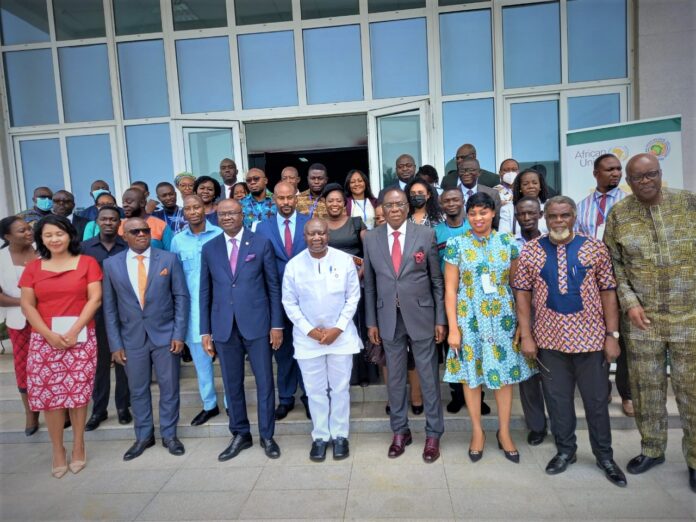William Nana Beeko || Chief Editor, AmaGhana Online
The African Union (AU) is poised to deal with the unfair, unjustifiable negative downgrades of its member countries by ‘so-called’ International Credit Rating Agencies which appears to impact negatively on investor confidence.
The AU in the light of this is advancing plans to establish Africa’s first-ever Credit Rating Agency as part of efforts to paint fair and the true fiscal analysis of economic situations contrary to those ones undertaken by these International Credit Rating Agencies.
This move has become critical because the AU believes that International Credit Agencies have never been fair to African countries.
This was revealed at a two-day sensitization workshop designed for African Union (AU) member countries on International Credit Rating which was organised by the African Peer Review Mechanism at the Ministry of Foreign Affairs in Accra.
The APRM is an African-owned and African-led platform for self-assessment, peer-learning, and experience-sharing in democracy and good governance, in full respect for democratic principles, human rights, rule of law, the acceleration of political, social, and economic integration in Africa.
APRM was tasked by the Specialized Technical Committee of Finance Ministers in 2018, to undertake a feasibility study for establishing an African Credit Rating agency.
The study found that it was feasible to establish such an institution as an independent entity of the African Union to provide alternative and complimenting rating opinions.
The workshop gathered participants including private sector entities, Institute of Directors’ members, policymakers, regulators, Chambers of Commerce, and other relevant stakeholders in Accra.
The main aim of this engagement was to improve the outcomes of future credit rating reviews through enhancing the engagements between international rating agencies and the representatives of the government.
Speaking at the workshop, the Chief Executive Officer of the APRM, Professor Eddy Maloka lamented the long periods of downgrades over the past years by International Credit Rating Agencies which has affected the progress of African countries.
He announced that the AU is in the process of working on the legal, structural and financial implications of establishing an African Credit Rating agency as an entity of the Union, and will be reporting the outcomes to the Minister’s committee later this year.
“As witnessed during the height of the Covid-19 pandemic, many African countries missed the opportunity of participating in the G20 Debt Service Suspension Initiative for fear of being downgraded by the international rating agencies. A few that participated suffered rating downgrades mainly because rating agencies classify them as defaulters,” he stated.
He added that these developments magnified the impact of the COVID-19 pandemic on African economies, many of which are still suffering severe strain on their fiscal positions.
“Other international organisations and regulators, such as the United Nations Human Rights Council raised similar concerns that the assessments of international rating agencies lack human rights considerations, is reducing fiscal space for governments to invest in health services, vaccines or social protection when it is sorely needed and is making government’s efforts to contain debt crisis ineffective. This is increasing the suffering of the general population,” he said.
He also indicated that the APRM issued a statement and held meetings with Moody’s and S&P’s following the rating downgrade of the Government of Ghana’s long-term foreign currency sovereign rating in February pointing out the inaccuracies and haste rating decisions by rating agencies.
He posited that there is clear evidence that the rating agencies did not pay due attention to neither the rating action nor concerns raised by the Government of Ghana following these rating actions.
Professor Maloka mentioned that ever since receiving the mandate to support countries from the AU Assembly, the APRM has achieved significant milestones, including developing a Policy Framework of mechanisms for the provision of support to countries in their engagements with international credit rating agencies.
These mechanisms, he identified included Research & Advisory Services, periodic engagements with three international rating agencies, technical and operational support to National Treasuries’ credit rating liaison teams, member states’ information-sharing, and peer-learning platform.
“All these are aimed at ensuring that International Credit Rating Agencies employ scientific methods of risk assessment that do not disadvantage African countries.
This, amongst many other issues, shows that ‘reforming the work of rating agencies’ is long overdue. Despite appealing against omissions and inaccuracies of key material information driving rating agencies’ decisions, no African country has ever succeeded in this endeavour.”
He said inadequacies in the regulation have left governments vulnerable to the irresponsible use of power by international credit rating agencies.
“There is no appeal authority on the continent that can conduct a fair hearing of the country’s submissions and pronounce a decision. Instead, the appeals are in accordance with the agency’s own rules, making international rating agencies both ‘the player and referee in Africa’. This is not the case in other territories.
He was glad that H.E. Nana Akufo-Addo, who is also the Champion of the African Union Financial Institutions, has urged African leaders to guard against the continuing consequential power of rating agencies on African economies during the 35th Ordinary Session of the AU Assembly of Heads of State and Government Session in February.
In his inaugural speech as Chair of the African Union, President Macky Sall also called for ending the “subjective” judgments of the rating agencies. The same sentiments have been echoed by other world leaders, including the UN Secretary-General, António Guterres, at the January General Assembly.
Given the nature of ratings and the influence of rating agencies, the inaccurate rating downgrades quickly discount the strength of fundamentals, frustrating the government’s efforts push for economic recovery from the effects of the Covid-19 pandemic,” he said.
Finance Minister, Ken Ofori-Atta, in a keynote address, said most of these downgrade decisions by foreign rating agencies, which most often are unjustified, have tremendous power to influence market expectations and investors’ portfolio allocations; and consistently undermine macroeconomic fundamentals of not only Ghana but also several other countries in Africa.
“We have a responsibility to ensure the agencies that influence investment decisions leverage methods and processes which ensure capital is directed toward well-appraised growth initiatives in emerging countries, such as ours, as opposed to earning sub-optimal returns overseas. The case for reform is stronger than it has ever been,” Ofori-Atta said.








































